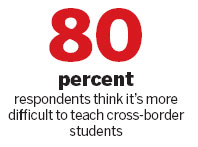Cross-border students a handful to HK teachers
Updated: 2012-09-13 06:37
By Fan Feifei(HK Edition)
|
|||||||||

Teachers of cross-border students want more help to deal with low-English-proficiency students and in their difficulties communicating with parents who live across the border.
The findings emerge from a survey conducted by the International Social Service Hong Kong Branch. The organization sent out 1,000 questionnaires on July 4 and 5. There were 350 responses. Teachers from kindergartens, primary and secondary schools in Yuen Long, Tai Po, Tuen Mun and North District were questioned.
About 80 percent of respondents perceived that it is more difficult to teach cross-border students, with more than half contending that the English proficiency of students is low. Another 42 percent of respondents complained that the parents of cross-border students could not give guidance in their children's studies.
Nearly 70 percent of respondents said they have difficulty communicating with the parents of the cross-border students. The explanation is straight forward. It is not convenient for the parents to come to Hong Kong and the teachers are unable to contact the parents.
There are about 12,800 cross-border students this year. It is estimated the number will rise to about 17,000 next year. The number of cross-border students increases by 30 percent each year, said the organization.
The survey also indicated that about 70 percent of the respondents thought the English tutorial classes after class are needed to improve that English level of the students and 83 percent of the teacher demanded the government allocate additional resources to deal with the issue of cross-border students.
The center said the teachers needed to spend much effort in caring for cross-border students, including transport arrangements, communication with parents, in addition to their teaching work.The teachers said if more government resources were allocated,the heavy burden on teachers could be reduced and they could spend more time teaching.
Cheung Yuk-ching, program director at the International Social Services center said, "the number of the cross-border students will continue to increase in the coming years", suggesting "the authority subsidize non-governmental organizations to set up some English cram sessions and remedial courses after class in Shenzhen and Hong Kong."
Cheung added a cross-border children family support center should be established in several districts of Shenzhen, because many children live in different district of the city. He recommended placing cross-border social workers at each school to help solve individual problem of students.
The center also suggested the government formulate long-term policy to support cross-bolder children and their families, including transport safety, care plan and settling down in Hong Kong in the future.
fanfeifei@chinadailyhk.com
(HK Edition 09/13/2012 page1)